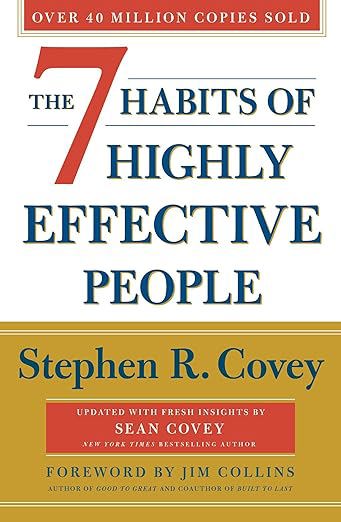Unveiling the Secrets of Business Success: A Review of "The 7 Habits of Highly Effective People"
I read a lot of books about business, but I can't believe how long it took me to get to this one. Stephen R. Covey’s timeless classic, “The 7 Habits of Highly Effective People”, cultivates a mindset and develops habits that drive excellence and sustainability. It is good not only in the business realm, but also can easily be applied to your personal life and relationships.
First published in 1989, "The 7 Habits" has become a cornerstone in the world of personal development and business leadership. Its principles have stood the test of time, resonating with entrepreneurs, executives, and professionals across industries. Let’s explore how this influential book impacts the world of business.
The author breaks it all down into 7 “habits”. The first 3 deal with the self, the next 3 deal with our relationships with others, and the final one deals with how we need to continue to develop all areas.
Habit 1: Be Proactive
Proactivity is the cornerstone of effective leadership. Covey emphasizes the importance of taking initiative and responsibility for one’s actions. In business, being proactive means anticipating challenges, seeking opportunities, and taking decisive action. Whether it’s launching a new product, resolving conflicts, or adapting to market changes, proactive leaders are catalysts for innovation and progress. I can attest to this habit; when I have been proactive, it always leads to better results. The key here is that we need to think about the results before we make our choices. Put some forethought into the various parts of our lives, whether they are business-related or for personal growth.
Habit 2: Begin with the End in Mind
Successful businesses have a clear vision of where they’re headed. Covey encourages readers to define their goals and priorities before diving into action. In the corporate world, this translates to creating a compelling mission statement, setting strategic objectives, and aligning all efforts toward a common purpose. Companies that begin with the end in mind are better equipped to navigate uncertainty and stay focused on long-term success. Create a plan, set a goal, map it out. When you have a goal, create a map to get you to that goal.
Habit 3: Put First Things First
Effective time management is crucial for business leaders juggling multiple responsibilities. Covey introduces the concept of prioritization based on importance rather than urgency. Business owners and managers must learn to delegate tasks, focus on high-impact activities, and maintain a healthy work-life balance. By putting first things first, leaders can maximize productivity and achieve meaningful results. Putting first things first will help you spend more time on things that are of more importance. Often, you'll have to say “no” to things that don't achieve your goals, even if they seem interesting.
Habit 4: Think Win-Win
In the competitive landscape of business, collaboration is key. Covey advocates for a mindset of mutual benefit, where success is not achieved at the expense of others. Businesses thrive when they foster win-win relationships with customers, partners, and employees. By seeking solutions that satisfy all parties involved, companies can build trust, loyalty, and sustainable growth. Believing that 2 parties can both “win” is crucial for long-term success. If their is no obvious win-win scenario or a conflict arises, then seek out another alternative or be okay with bowing out of the project. Other scenarios of win-lose or lose-win are not sustainable for the long-term.
Habit 5: Seek First to Understand, Then to Be Understood
Communication is at the heart of effective leadership. Covey emphasizes the importance of empathetic listening and genuine understanding. In business, this means actively listening to customers, colleagues, and stakeholders to uncover their needs and concerns. Leaders who seek first to understand create a culture of trust and collaboration, paving the way for innovative solutions and stronger relationships. Often, looking past what others are saying, and trying to deduce what they mean or need is the key here. After listening to someone's concerns, make sure you understand their true meaning. Listen first, talk second.
Habit 6: Synergize
Synergy is the secret sauce of successful teams and organizations. Covey defines synergy as the combined strength of individuals working together toward a common goal. In business, synergy emerges when diverse talents and perspectives are embraced. By fostering a culture of collaboration and open-mindedness, companies can unlock creativity, drive innovation, and achieve greater results than any individual effort could produce. This is the idea of 1 + 1 = 3 (or more). We are more together than we are alone.
Habit 7: Sharpen the Saw
Continuous improvement is essential for staying ahead in the fast-paced world of business. Covey encourages readers to invest in self-renewal across four dimensions: physical, mental, emotional, and spiritual. Business leaders who prioritize self-care and personal development are better equipped to navigate challenges, inspire others, and sustain long-term success.
"The 7 Habits of Highly Effective People" offers a roadmap for personal and professional transformation. Its timeless principles have revolutionized the way we approach leadership, productivity, and success in business. By embodying these habits, entrepreneurs and executives can create thriving organizations that make a positive impact on the world.
Whether you’re a seasoned business leader or an aspiring entrepreneur, "The 7 Habits" is a must-read that will empower you to unleash your full potential and achieve extraordinary results in business or even in your personal relationships.


